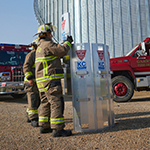Food Safety Modernization Act
Understanding FSMA's impact on the food industry.
In 2011, the Food Safety Modernization Act (FSMA) established a new regulatory framework that affects most sectors of the food industry, including producers, importers, distributors, manufacturers and transporters of human and animal foods consumed in the U.S.
FSMA moves beyond detection and response strategies to take a preventive approach requiring hazard analysis of ingredients, materials and processes.
Seven of FSMA’s 41 sections require action from those growing, producing, handling, holding or transporting food and feed products. To help you gain a better understanding of these seven components and who may be affected, we've provided a brief overview.
1. Current Good Manufacturing Practice (CGMPs), hazard analysis and risk-based preventive controls for human food (preventive controls)Most facilities that manufacturer, process, pack or hold food for human consumption in the U.S. must establish a food safety system that:
- Analyzes known or reasonably foreseeable biological, chemical and physical hazards
- Implements preventive controls and a recall plan
- Manages preventive controls through monitoring, corrective actions and verification
- Updates and clarifies CGMPs for human food production
- Inducts a qualified program overseer
Learn more about the CGMPs, hazard analysis and risk-based preventive controls for human food
2. CGMPs, hazard analysis and preventive controls for animal foodMost facilities that manufacturer, process, pack or hold animal food for consumption in the U.S. must establish a food safety system that addresses the aspects listed above tailored specifically to animal food and feed production.
Learn more about the CGMPs, hazard analysis and risk-based preventive controls for food for animals
3. Standards for growing, harvesting, packing and holding of produce for human consumption (produce safety)This proposed rule establishes mandatory food safety practices for domestic and foreign farms that grow, harvest, pack or hold produce for consumption in the U.S. New produce safety practices include:
- Two sets of criteria for determining microbial water quality, both based on the presence of generic E. coli, which can indicate the presence of fecal contamination
- Biological soil amendments require 120-day intervals between raw manure applications to crops in contact with the soil, while 90-day intervals are required for crops not in contact with the soil
- Implementing raw manure application methods to minimize contact with covered produce during or after application
- Microbial standards for stabilized compost, limiting detectable amounts of bacteria, such as Listeria monocytogenes, Salmonella spp., fecal coliforms and E. coli 0157:H7, for processes used to treat biological soil amendments, including manure
- Measures to prevent introducing dangerous microbes into/onto seeds or beans used for sprouting
- Testing spent irrigation water or in-process sprouts in each production batch for certain pathogens
- Testing sprout growing, harvesting, packing and holding environment for the presence of Listeria species or Listeria monocytogenes
- Taking corrective actions if spent sprout irrigation water, sprouts and/or an environmental sample tests positive
- Requiring farmers to take all measures reasonably necessary to identify and not harvest produce that is likely to have been contaminated by domesticated or wild animals
- Employing measures to prevent the contamination of produce and food-contact surfaces by ill or infected persons
- Using hygienic practices when handling covered produce or food-contact surfaces
- Requiring health and hygiene training for farm workers and supervisors
- Applying measures, such as appropriate storage, maintenance and cleaning of equipment, tools and buildings, to prevent contamination of covered produce and food-contact surfaces.
Most entities importing food to the U.S., including domestic facilities and food brokers, are required to develop, maintain and follow an FSVP, which helps ensure that foreign suppliers produce food in compliance with FDA standards for preventive controls and produce safety.
Importers (owners or consignees of food imported into the U.S.) are responsible for:
- Determining known or reasonable foreseeable hazards with each food
- Evaluating the risk posed by a food based on hazard analysis and foreign supplier performance
- Using the evaluation of risk to approve suppliers, determine appropriate verification activities and corrective actions
Learn more about Foreign Supplier Verification Programs for importers of food for humans and animals
5. Sanitary transportation of human and animal food (sanitary transport)Unless exempt, most U.S. shippers, carriers, loaders and receivers must employ the following measures to ensure the safety of food during transportation:
- Vehicles and equipment must be designed and maintained to prevent the adulteration of transported food
- Shippers, carriers and receivers must utilize contamination prevention strategies, such as temperature control, to ensure food safety during transportation
- Shippers must inform carriers of the necessary requirements for transported products and must engage in verification activities before shipment
- Carriers must supply vehicles that meet the shipper’s requirements, document temperature control, implement sanitary transport procedures and appropriately train personnel
- Receivers must maintain the sanitary condition of food upon delivery
Learn more about sanitary transportation of human and animal food
6. Focused mitigation strategies to protect food against intentional adulteration (food defense)To help prevent terrorist attacks on the U.S. food supply, most FDA-registered food facilities must implement a food defense plan similar to the food safety plan under the Preventive Controls rule.
The plan must include:
- Vulnerability assessment of the potential impact on public health, degree of physical access to the product and ability to successfully contaminate the product
- Mitigation strategies at each actionable process step to help provide assurance that vulnerabilities will be minimized or prevented
- Implementation of at least one focused mitigation strategy for each identified actionable process step
- Monitoring mitigation strategies, conducting corrective actions and mitigation strategy verification
- Training of all personnel assigned to vulnerable areas
- Documenting all food defense activities subject to FDA inspection
Learn more about focused mitigation strategies to protect food against intentional adulteration
7. Accreditation of third-party certification bodies to conduct food safety audits and to issue certifications (third party accreditation)The FDA is responsible for ensuring FSMA compliance and has increased its partnership with food industry stakeholders. Leveraging its oversight capabilities, the FDA has also established a mechanism where private auditors need FDA-accreditation to issue food safety certifications to foreign food facilities.
Questions about FSMA?FSMA’s impact is far-reaching and affects most sectors of the food industry. Contact your Nationwide food safety consultant with questions about FSMA requirements or refer to the FDA website for further details.

 >
>

 >
>
 >
>